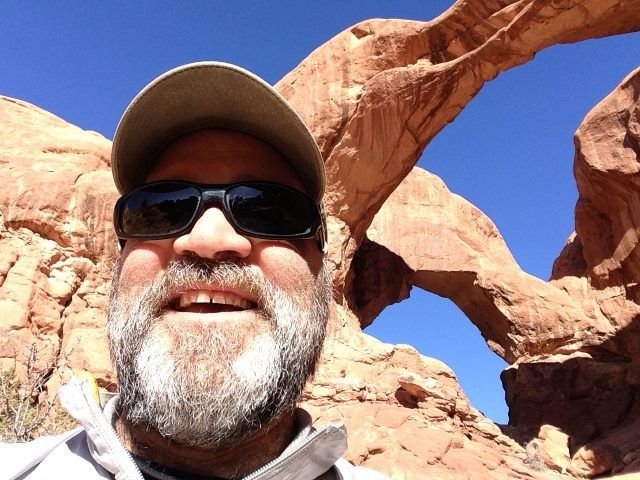Some information may be outdated.
Aristotle wisely suggested “In all things of nature there is something of the marvelous”—and millions of people annually come to find some of that “marvelous” here in Moab on our federally owned and managed public lands. Why wouldn’t they? Due to a combination of desolation, ruggedness, a dearth of economically recoverable resources, and despite the ability of Western pioneers to take title to these lands under Mining and Homestead Acts, Utah is blessed with some of the largest tracts of open public land left in our nation. These lands now provide the livelihood for almost half the residents of Grand County, thanks to travelers who seek a spiritual recharge with a visit to experience our land in its natural state.
Americans have long known the value of such places and the huge impact on our quality of life. Congress created a system to protect our nation’s gems through the Antiquities Act (1906), which allowed for presidential proclamation of national monuments and which allows Congress to designate national parks transitioning from a monument like Arches and Zion, or for new parks like Canyonlands. Seeking further levels of protection for our special places, Congress passed the Wilderness Act (1964), currently the highest level of protection for our public domain.
Unbelievably, these lands are under threat from some short-sighted loud people and corporations outraged about potential protections—in the face of irrefutable evidence that protected lands are a great benefit to the economy. Fortunately, there is legislation in Congress to protect America’s Red Rock Wilderness, co-sponsored by representatives of more than 100 million Americans in the 113th Congress toward a goal supported by a majority of people in Utah and nationally as consistently demonstrated by polls.
We also ridiculously have the State demanding title to 30 million acres of federal land, despite our Constitution: Article3/Sec2: “The people inhabiting this State do affirm and declare that they forever disclaim all right and title to the unappropriated public lands lying within the boundaries … and that until the title thereto shall have been extinguished by the United States, the same shall be and remain subject to the disposition of the United States …” These demands come without offer of compensation for the taking either—as if the people of the United States, who paid for this land with their blood and money, should just simply hand title over.
This is all under the guise of “local control,” a bogus premise shared by Congressman Rob Bishop in his Public Lands Initiative (PLI). (Defining “local control” has been tricky—apparently to some elected public servants and bullies, it seems to mean “MY WAY”—yet I can’t imagine any of them being okay with a “locally” endorsed Yankees cap on the Statue of Liberty.)
Mr. Bishop pontificates about President Obama’s utilizing the Antiquities Act, whining “Obama sidelined the American public and bulldozed transparency by proclaiming three new national monuments through executive fiat,” and “(Obama) has shown once again…utter and complete disdain for the public process, Congress, and the communities most impacted by these unilateral, unchecked land designations.” (Salt Lake Tribune, Feb. 23). Yet Bishop flagrantly ignores local advocacy and support for years and even decades for recognition of these prominent values, a legitimate part of the process toward protection of our heritage. In the meantime, the very process of his PLI is suspect with its glaring omission of relevant stakeholders: the American people. Bishop’s process seems to only seek input from “friendly” voices from counties as he seeks “resolution” of this contentious issue, counties with legal boundaries that ignore ecological ones, with the potential to further fragment fragile ecosystems with predictably differing priorities for planning. Anyone else see a problem with a tenant demanding to set the rules for their landlord?
I met with Bishop’s office; they suggested that “their people” don’t agree with conservationists, fostering an adversarial, as opposed to collaborative, environment—a view reinforced by the shouting bullies at our county meetings — as if theirs are the only valid opinions. His office also suggested when he decides what is to be designated wilderness, other qualifying lands could be released from consideration for wilderness designation or any protections under the Antiquities Act, clearing the way for development of our dwindling wild lands. As the House Resource Committee chairman, Bishop dictates that no amendments will be accepted from any delegation, completely missing the point that these lands don’t belong to the counties or to his committee; they are owned by We, the People.
The Grand County Council should disregard the rude few who forgot the uranium bust and scrap the PLI altogether and insist that Congress, not just a few localities, do the job it was charged with and pass an unencumbered America’s Red Rock Wilderness Act to protect our unspoiled marvelous places — as well as our economic future.
Michael Coronella became involved in land-use management issues after backpacking across southern Utah three times and seeing the impact of management policy monopolized by industry. He owns Deep Desert Expeditions, a backcountry guiding service.
Appreciate the coverage? Help keep local news alive.
Chip in to support the Moab Sun News.



